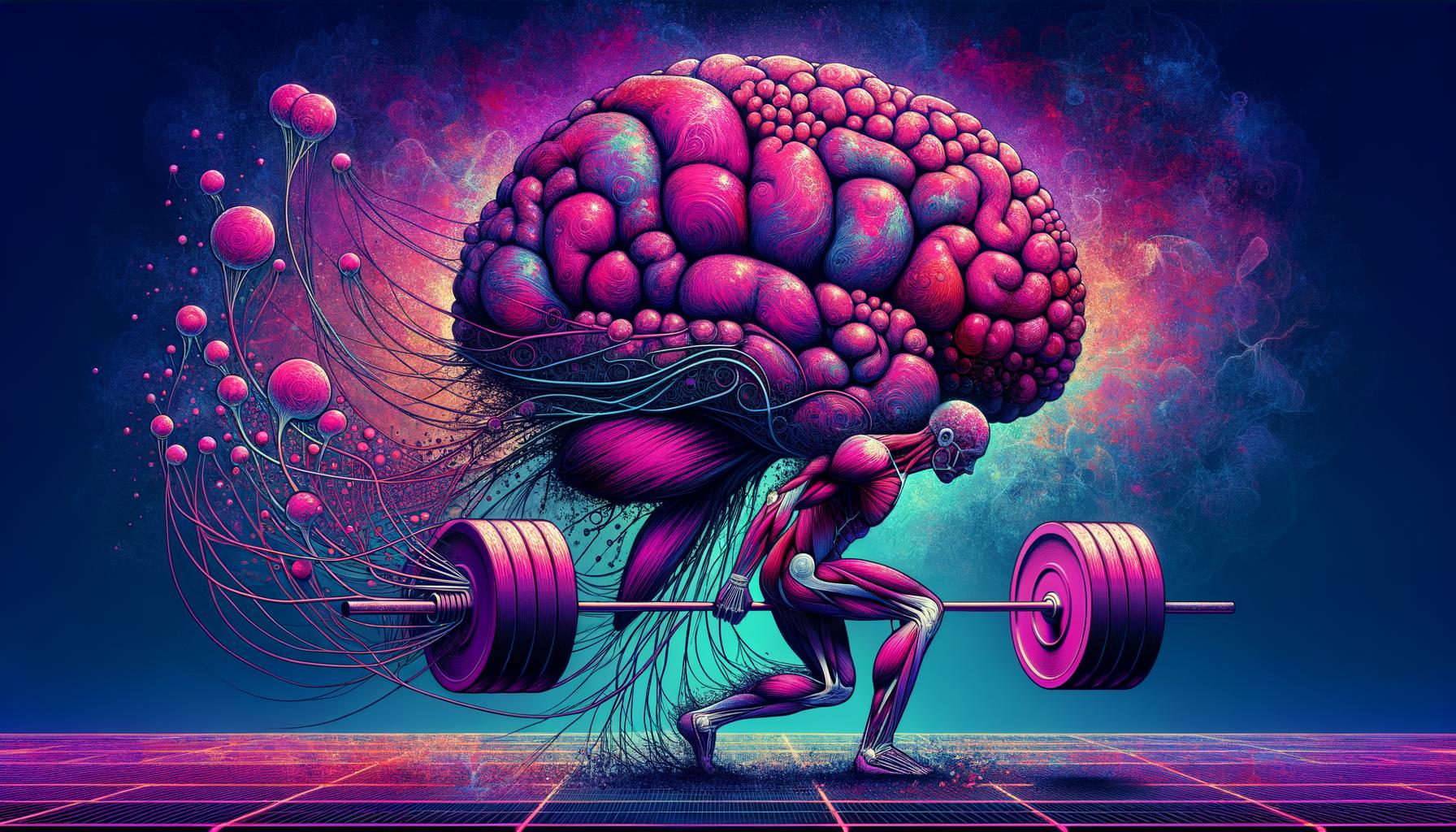· fitness · 17 min read
Optimizing Athletic Performance with Mental Skills Training
Explore how mental skills training enhances athletic performance, unveiling strategies like goal setting, visualization, and focus techniques. Discover the synergy between mental preparedness and physical readiness.

In This Post
The Fact Why Should I Care How To Put In Action Start Tomorrow Guide How does it effect my ability to focus How does it impact my daily life How does it help me make friends How does it help me manage stress How does it effect my mood Summary: Remember Refresher Checklist The Full Research Article CitationsPrint Out The Tomorrow Checklist!
Sign up for our newsletter and receive a copy today, so that, you can start tomorrow! Or the next day, or the day after that. I forget everything and starting things is hard at least for me so these checklists are godsend.
Print Out The Remember Refresher Checklist!
Sign up for our newsletter and download your own copy of the Remember Refresher Checklist, so that, you can easily put it on your fridge and help you stay on target towards your WHY. Every little bit helps.
Introduction to Mental Skills Training in Sports

In the world of sports, where physical capabilities are often pushed to their limits, the role of mental toughness and psychological skills training in optimizing athletic potential is sometimes underestimated. Mental skills training in sports goes beyond the physical aspects of training, focusing on building resilience, enhancing focus and concentration, and developing strategies that lead to peak performance and athletic success factors.
The Significance of Mental Skills Training
Mental preparation in sports is as crucial as physical training. Studies in sports psychology have shown that athletes who engage in mental skills training enhance not only their performance but also their enjoyment of the sport. This training involves various psychological strategies for athletes that help manage stress, preserve mental health, and maintain motivation over long periods.
The benefits are clear:
- Improved focus and concentration during competitions.
- Enhanced sports training efficiency.
- Greater resilience in the face of setbacks.
- Optimization of athletic potential for peak performance.
Overview of Mental Skills: Goal Setting, Visualization, and Focus Techniques
Mental skills training encompasses several key areas, each contributing uniquely to an athlete’s performance enhancement and mental toughness. Let’s delve into three fundamental techniques: goal setting, visualization, and focus.
Goal Setting in Sports
Setting clear, achievable goals is the foundation of mental skills training. This practice helps athletes maintain direction and motivation throughout their training and competitions.
Key steps in effective goal setting include:
- Identifying long-term objectives.
- Breaking down long-term objectives into smaller, manageable tasks.
- Regularly reviewing and adjusting goals as needed.
- Celebrating small victories along the way.
Visualization Techniques
Visualization, or mental imagery, involves athletes picturing themselves performing at their best. This technique is a powerful tool for enhancing performance, helping athletes to mentally prepare for the movements and strategies they will use in competition.
The effectiveness of visualization lies in its ability to mentally simulate the desired outcome, building an athlete’s confidence and readiness.
Focus and Concentration
Maintaining focus during training and competition is critical for optimal performance. Athletes use techniques such as meditation and mindfulness to improve their mental concentration. These practices aid in controlling distractions and honing in on the task at hand, which is especially important in high-pressure situations.
In conclusion, integrating mental skills training with physical preparation is essential for athletes aiming to optimize their performance. Through goal setting, visualization, and focus techniques, athletes can enhance their mental toughness and resilience, contributing significantly to their athletic success. Stay tuned for further insights into the science behind mental skills and athletic performance in the next segment of this series.
The Science Behind Mental Skills and Athletic Performance

How Mental Toughness Influences Athletic Success
Mental toughness is like the secret ingredient that helps athletes face challenges head-on, maintain focus under pressure, and push through the tough times. Think of it as the inner strength that turns “I can’t” into “I can and I will.” It’s not only about working hard but also working smart, showing resilience, and having the confidence to make the tough decisions when it matters most.
Athletes with mental toughness share a few critical characteristics:
- Resilience: The ability to bounce back from setbacks or failures.
- Confidence: Believing in their skills and abilities.
- Motivation: A strong drive to improve and succeed.
- Focus: The capability to concentrate on the task at hand, undistracted by the surroundings.
By nurturing mental toughness, athletes can significantly enhance their performance and edge closer to their ultimate goals.
The Role of Concentration in Sports Performance
Concentration in sports is like the lens of a camera, focusing on what’s important while blurring out the rest. It’s about paying attention to the right cues at the right time. Whether it’s a basketball player taking a free throw, a tennis player preparing to serve, or a sprinter ready at the starting blocks, maintaining focus is crucial.
However, concentration is not just about focusing on one thing but also about swiftly shifting focus when needed. Here’s a simple checklist to help improve concentration:
- [ ] Set clear, concise goals for each practice and game.
- [ ] Practice mindfulness and meditation to enhance focus.
- [ ] Work on situational awareness drills to better manage distractions.
- [ ] Use visualization techniques to prepare for various scenarios.
- [ ] Develop a pre-performance routine to enhance focus before events.
Stress Management for Peak Athletic Achievement
Stress is an inevitable part of sports, but managing it is what makes the difference between good and great athletes. Effective stress management helps athletes to stay calm, make better decisions, and perform optimally under pressure.
Here are some key stress management techniques used by top athletes:
- Deep Breathing: A simple yet powerful way to reduce anxiety and calm the mind.
- Progressive Muscle Relaxation: Tensing and relaxing muscle groups can decrease physical tension associated with stress.
- Positive Self-Talk: Replacing negative thoughts with positive affirmations can boost confidence and reduce stress.
- Time Management: Organizing time effectively can reduce pre-competition stress.
- Visualization: Imagining success can help calm nerves and improve focus.
Managing stress is not about avoiding it but learning to harness it, turning nervous energy into focused performance. By combining mental toughness, improved concentration, and effective stress management, athletes can unlock their true potential and achieve peak athletic performance.
Implementing Mental Skills Training in Physical Programs

Integrating Goal Setting with Physical Training Routines
One of the most powerful tools in an athlete’s mental skills toolkit is goal setting. It isn’t just about defining what you want to achieve, but how it interlinks with your physical training to create a roadmap towards success. Integrating goal setting with physical training requires a systematic approach where each physical milestone is paired with a mental strategy, ensuring that both aspects work in harmony.
Creating S.M.A.R.T (Specific, Measurable, Achievable, Relevant, Time-bound) goals can significantly enhance your physical training routines. For instance, if your goal is to improve your marathon time, you would incorporate specific mental skills like positive self-talk or focus techniques during your long runs, making the physical and mental aspects of your training inseparable.
- **Checklist for Integrating Goal Setting with Physical Training**
- [ ] Define your long-term athletic goal.
- [ ] Break down your goal into specific, measurable milestones.
- [ ] Identify mental strategies that complement each milestone.
- [ ] Schedule regular reflection sessions to assess progress.
- [ ] Adjust goals and strategies as needed.
Visualization Techniques for Enhanced Performance
Visualization, or mental imagery, is a pivotal part of elevating an athlete’s game. It involves vividly imagining yourself succeeding in your sport, which primes your body to perform the movements in reality. This mental rehearsal can dramatically boost confidence and decrease anxiety before competitions or intense training sessions.
Athletes can use visualization to envision perfecting a technique, winning a game, or even overcoming a challenging obstacle. This mental practice should reflect the athlete’s goals, integrating seamlessly with their physical training plan. For instance, a swimmer can visualize each stroke, turn, and finish during quiet moments in their day, thereby enhancing their physical training with mental precision.
Focus Techniques to Maintain Concentration Levels
Maintaining high levels of concentration during training and competitions is crucial for optimal performance. Athletes can employ various focus techniques to keep their minds sharp and prevent distractions. One effective method is mindfulness meditation, which trains the brain to stay focused on the present moment, enhancing the athlete’s ability to concentrate during crucial points of performance.
Another technique is the use of cue words or phrases—simple, powerful reminders to focus on the task at hand. These can be integrated into physical routines, turning each repetition or drill into not just a physical, but a mental exercise as well.
Implementing mental skills training within physical programs is not an overnight process, but through consistent practice and integration, athletes can unlock new levels of performance. By setting clear goals, visualizing success, and employing focus techniques, athletes strengthen their mental toughness, paving the way for both physical and psychological victories on the field.
Case Studies and Testimonials

The journey to athletic excellence is a blend of physical prowess and mental strength. Over the years, numerous athletes have harnessed the power of mental skills training to reach new heights in their careers. Through a series of case studies and testimonials, the impact of integrating mental preparation with physical training becomes vividly clear.
Success Stories: Athletes Who Excelled with Mental Skills Training
The stories of athletes who have significantly benefited from mental skills training are both inspiring and illuminating. One such example is an Olympic swimmer who fought back from a career-threatening injury to clinch gold. Prior to her comeback, she engaged in rigorous mental conditioning, focusing on visualization techniques and goal setting in sports. She visualized every stroke, every turn, and the triumphant touch at the end of the pool, as vividly as if she were racing. This meticulous mental preparation played a crucial role in her physical training and eventual victory.
Another striking success story comes from a marathon runner who overcame the mental barrier of the “wall” — a point where physical exhaustion seems insurmountable. Through mental toughness training, focusing on stress management for athletes and building resilience, he learned to push through the pain, resulting in a personal best time and qualification for major international competitions.
Comparative Analysis: Athletes Before and After Mental Skills Integration
A comparative analysis of athletes’ performances before and after integrating mental skills into their training regimens reveals a significant improvement in results. This improvement is not just in their performance metrics (such as times, distances, or scores) but also in their consistency, focus during competitions, and recovery from setbacks.
- Before mental skills integration:
- Inconsistent performance
- Difficulty in maintaining concentration under pressure
- Challenges in managing competition stress
- After mental skills integration:
+ Improved performance consistency
+ Enhanced ability to stay focused throughout competitions
+ Better stress management and resilience
Coaches’ Perspectives on Mental and Physical Training Synergy
From the coaches’ viewpoints, the synergy between mental and physical training cannot be overstated. Coaches report that athletes who embrace mental skills training alongside their physical preparation tend to be more adaptable, strategically aware, and mentally resilient. These athletes are better at setting realistic goals, visualizing success, and maintaining concentration even in high-pressure situations. Coaches also note that mental skills integration fosters a more holistic approach to training, where athletes develop as complete competitors, not just physically but mentally and emotionally too.
Feedback from Sports Psychologists
Sports psychologists play a crucial role in developing and implementing mental skills training programs for athletes. They emphasize that mental preparation in sports is essential for achieving peak performance. Psychological skills training, including techniques like visualization, focus and concentration exercises, and stress management strategies, equip athletes with the tools needed for overcoming the immense pressures of competition. Feedback from sports psychologists underscores the transformative impact of mental skills training on athletes’ performance, resilience, and overall mental health.
Through these case studies and testimonials, the compelling connection between mental skills training and athletic success is evident. As athletes continue to push the boundaries of what’s physically possible, the integration of mental strategies into their training routines stands as a testament to the undividable bond between mind and body in achieving sporting excellence.
FAQs on Mental Skills Training in Sports

Athletes and coaches often have questions about incorporating mental skills into their training regimen. Here, we tackle some of the most common inquiries to clarify how mental skills training can elevate athletic performance.
How to Start Integrating Mental Skills into Physical Training?
Integrating mental skills into your physical training can seem daunting at first, but it’s a straightforward process when approached methodically. Begin by setting clear, achievable goals. Then, introduce visualization and focus techniques into your training sessions. Practice these mental exercises regularly, both in isolation and in conjunction with physical training.
- Identify clear, achievable goals.
- Schedule regular visualization exercises.
- Incorporate focus techniques during physical training.
- Practice stress management strategies.
- Seek feedback from a coach or sports psychologist.
Can Mental Skills Training Replace Physical Training?
No, mental skills training cannot replace physical training. However, it’s a complementary component that enhances physical training. Mental training helps athletes manage stress, maintain focus, and visualize success, which can significantly improve performance when combined with a rigorous physical training regimen. Think of mental training as the sharpening of the mind that works in harmony with the strengthening of the body.
How Long Before I See Results from Mental Skills Training?
The timeline for seeing results from mental skills training varies among athletes due to factors like the starting skill level, the quality of the training program, and individual dedication to the process. Generally, some benefits, such as improved focus and stress management, can be noticed relatively quickly—within a few weeks of consistent practice. More tangible results in athletic performance can take longer, often several months, to manifest. It’s important to remain patient and consistent with practice.
Athletic performance is influenced by a blend of physical prowess and mental fortitude. Integrating mental skills into your training doesn’t just prepare the body but also sharpens the mind, leading to a holistic approach to sports training. By setting clear goals, practicing visualization and focus techniques, and being patient, athletes can uncover a new level of performance capability. Remember, mental skills training complements physical training; it enriches the process, leading to optimized athletic potential and ultimately, enhanced sports training outcomes.
Conclusion - The Future of Mental Skills in Athletic Training

As we have explored the multifaceted world of mental skills training in sports, the profound impact these techniques have on optimizing athletic performance cannot be overstated. It’s clear that the integration of mental strategies with traditional physical training regimens is not just a trend but a paradigm shift in the ways athletes and coaches approach preparation for competition. Mental toughness, visualization techniques, goal setting in sports, and focus and concentration strategies enhance athletic performance, demonstrating the critical role of psychological skills alongside physical prowess.
Summarizing the Impact of Mental Skills Training on Athletic Performance
The integration of mental skills training into athletic preparation offers a comprehensive approach to achieving peak performance. By nurturing mental toughness, athletes can face the pressures of competition with resilience. Visualization techniques allow the mind to experience success before the body executes the performance, reinforcing the belief in one’s capabilities. Goal setting in sports provides clear targets for athletes, fostering motivation and a focused direction in training. Lastly, enhancing focus and concentration ensures that athletes can maintain their performance under various conditions.
Athletes who embrace mental skills training experience a range of benefits, including improved stress management for athletes, increased self-confidence, and the ability to stay focused under pressure. These effects contribute to not just short-term gains but long-term success in their sporting careers. Furthermore, mental skills training offers valuable life skills, aiding athletes in their personal development beyond the field.
The landscape of athletic training is evolving, with a growing recognition of the crucial balance between mental preparedness and physical readiness. As the success stories accumulate, it becomes increasingly clear that mental and physical training must go hand in hand for athletes aiming for the pinnacle of their potential.
Checklist for Integrating Mental Skills Training:
- [ ] Establish a routine for daily mental skills practice
- [ ] Set clear, achievable goals for both mental and physical aspects of training
- [ ] Regularly practice visualization techniques, imagining personal success
- [ ] Develop and maintain focus strategies to enhance concentration
- [ ] Identify stress triggers and implement effective management techniques
- [ ] Seek feedback from coaches or psychologists to refine mental skills
- [ ] Measure progress and make necessary adjustments to mental training strategies
- [ ] Celebrate milestones to reinforce the value of mental skills training
As we look to the future, the inclusion of mental skills training in athletic programs is expected to become the norm, rather than the exception. This trend signifies a holistic approach to sports preparation, where the mental aspect of performance receives as much attention as the physical. Through continued research and application of sports psychology principles, athletes can continue to break barriers and achieve new heights in their performance.
The integration of mental skills into athletic training signals a brighter future for sports, one where athletes are not only physically but also mentally equipped to excel. As the dawn of this new era in sports rises, it promises an exciting landscape of innovation, inclusivity, and unprecedented accomplishments in athletic performance. The journey towards optimizing athletic potential is ongoing, and mental skills training remains an indispensable part of that journey.
3 Relevant Links - Mental Skills Training in Sports

Exploring further into the realm of mental skills training in sports, several resources stand out for their comprehensive coverage, expert insights, and practical guidelines. These resources can provide athletes, coaches, and sports enthusiasts with valuable information on optimizing athletic performance through psychological skills training. Whether you’re beginning your journey in sports psychology or looking to enhance your mental conditioning strategies, these links serve as a crucial stepping stone towards achieving peak performance and building resilience in sports. Let’s delve into these resources:
1. American Psychological Association (APA) - Sport Psychology
The American Psychological Association (APA) offers an extensive repository of knowledge on sport psychology, focusing on the benefits of mental skills training for athletes. This resource is an invaluable asset for understanding the psychological aspects of athletic performance, offering insights into mental toughness, stress management strategies, and the pivotal role of mental health in sports. Here you will find:
- Articles and research papers on enhancing athletic success factors through psychological interventions.
- Guidelines for implementing goal setting and visualization techniques in training routines.
- Strategies for optimizing athletic potential by integrating mental and physical training aspects.
This resource is a must-visit for individuals looking to deepen their understanding of sports psychology and its impact on performance.
2. National Association of Sports Medicine (NASM) - Sports Performance Training
The National Association of Sports Medicine (NASM) specializes in sports performance training, with a focus on integrating mental skills into physical training programs. This platform offers:
- Comprehensive guides on developing mental toughness and resilience in athletes.
- Training modules on visualization techniques and focus enhancement strategies.
- Expert advice on mental and physical training synergy for peak athletic performance.
The NASM’s resources are tailored for fitness professionals, athletes, and anyone interested in advancing their knowledge on mental skills integration in sports training.
3. International Society of Sports Psychology (ISSP) - Mental Skills Training
The ISSP is renowned for its holistic approach to mental skills training in sports. Their handbook provides:
- A comprehensive guide on psychological skills training for enhancing sports performance.
- In-depth discussions on stress management, concentration, and mental preparation techniques.
- Evidence-based practices for mental conditioning and sports and mental health.
By exploring these resources, athletes and coaches can gain a thorough understanding of how to apply mental strategies for athletic performance improvement and how to maintain psychological well-being in competitive environments.
Essential Checklist for Integrating Mental Skills in Sports Training
To ensure a structured approach to integrating mental skills training into your sports routine, consider the following checklist:
- [ ] Set clear, achievable goals for both mental and physical aspects of training.
- [ ] Practice visualization techniques regularly to enhance focus and performance.
- [ ] Incorporate concentration exercises to maintain high levels of mental sharpness during
competitions.
- [ ] Develop a stress management plan to navigate high-pressure situations effectively.
- [ ] Seek feedback from coaches or sports psychologists to refine your mental training
strategies.
- [ ] Dedicate time for mental health and recovery to build resilience and prevent burnout.
- [ ] Continuously assess your progress and adjust your training plan as necessary.
By exploring the links provided and following the essential checklist, athletes and coaches can effectively integrate mental skills training into their sports routines, paving the way for enhanced athletic performance and psychological well-being.





